Contents
Blackberry is a crop that is steadily gaining popularity among gardeners. It is valued not only for its original taste, but also for its health benefits, higher yields and better immunity compared to raspberries. Blackberry Loch Mary is one of the new selections. Its obvious advantage is its outstanding taste.
History of breeding
Blackberry Loch Maree (Loch Maree), sometimes found in Our Country under the names “Loch Mary” or “Loch Marie”, is currently the last variety in a series that receives names in honor of the Scottish lakes. She, like her “predecessors”, was created at the Institute of Horticulture of this state (SCRI).
The variety appeared on sale in 2015. Loch Mary is a complex hybrid, the result of breeders’ experiments with previously created varieties, as well as wild blackberries, raspberries and loganberries.
Description of the Loch Mary blackberry
Blackberry Loch Mary – semi-creeping variety. Bush with initially upright, but gradually drooping shoots, without thorns. Stems in adult plants are characterized by rapid growth, in young seedlings their length increases relatively slowly.
The foliage of the bushes is average. The leaves are large, deep green, with a serrated edge. Against this background, the flowers look very impressive – terry, as if double, of a pale pink hue.
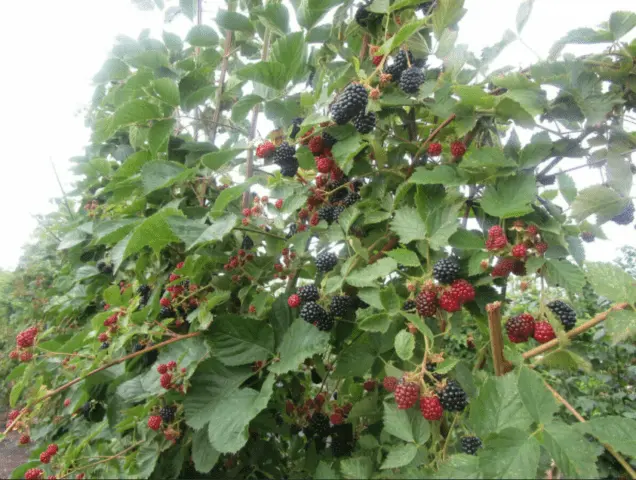
For the first 2-3 years, the shoots on the blackberry bushes of Loch Mary grow to about a meter, their total height will eventually be about 4 m
The berries are collected in brushes of 3-5 pieces. The shape of most of them is rounded, less often come across slightly elongated. The average weight is 8 g, individual specimens weigh 12-15 g each. The skin is glossy black, elastic, which provides the crop with good keeping quality and transportability.
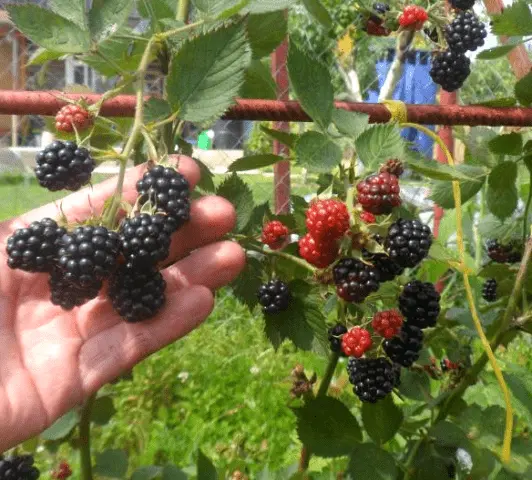
The drupes of blackberries are firmly attached to each other
The pulp is of medium density, the seeds are small, they are practically not felt when eating. The taste is pronouncedly sweet, with a very light refreshing sourness and a “berry-peach” aftertaste. There is also a characteristic “blackberry” aroma, which remains after heat treatment in homemade preparations.
Characteristic of the variety
The creators of the Loch Meri variety were conceived as universal, suitable for growing by both professional farmers and amateur gardeners. But so far it is in demand mainly by owners of personal plots. Those who grow berries on an industrial scale are “scared off” by their small size and general “plainness”.
Ripening time and yield
Blackberry Loch Mary belongs to the medium-early varieties. Harvested in the first half of July, in the south of Our Country – in the last decade of June. On average, you can count on 15 kg from an adult bush. The first berries are removed three years after planting in the ground.
Winter hardiness
Cold resistance for Our Country is low – up to -15 ° С. Without prior preparation, bushes can winter only in warm southern regions.
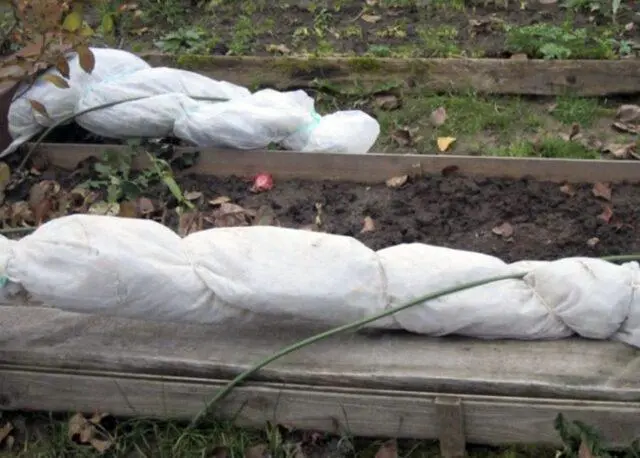
For regions referred to as “risk farming zones”, Loch Mary blackberry is not a very suitable variety.
Disease and pest resistance
Resistance to diseases at the level of the standard. The only exception is that the variety is susceptible to infection with gray rot. This is almost inevitable if the bushes are grown in a humid climate or the gardener is not too lucky with the weather in the summer.
The creators of the Loch Mary blackberry variety declare its high resistance to pests. Gardeners do not yet have much experience in cultivation, which allows to confirm or refute this information.
Pros and cons of the variety
The Loch Mary blackberry variety belongs to the dessert category. The taste qualities of the berries were highly appreciated by professional tasters.
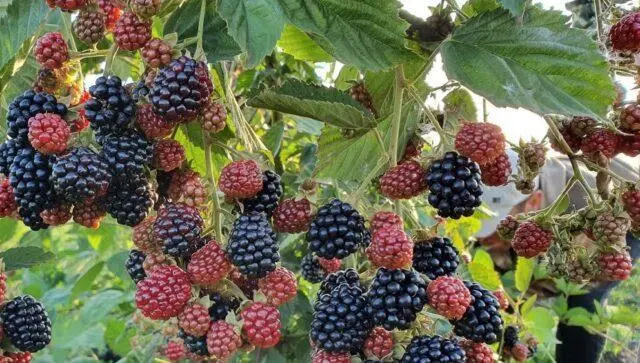
Loch Meri blackberries are suitable for any home-made preparations, they are widely used in cooking as a filling for baking.
Pros:
- decorative bush during flowering, “help” in attracting pollinators to the site (the plant itself is a good honey plant);
- lack of thorns on the shoots;
- consistently high yield (even in “unsuccessful” years, not less than 12-13 kg);
- the versatility of the purpose of the fruit;
- excellent taste qualities of berries both fresh and home-made;
- very good keeping quality and transportability for blackberries;
- fairly good immunity to most pathogenic fungi, high resistance to pests.
Cons:
- relatively small size of berries;
- insufficient cold resistance for most regions;
- propensity to become infected with gray rot when conditions are favorable for the development of the pathogen;
- uneven growth of the bush;
- tall shoots that need regular pruning.
Rules of landing
Due to low cold tolerance, it is recommended to plant Loch Mary blackberries in spring. The specific time depends on the local climate. In the south, the substrate warms up sufficiently by mid-April. In central Our Country, where infrequently, but still there are return spring frosts, you will have to wait until the second decade of May.
The site for planting Loch Mary blackberries is chosen based on several criteria:
- Good illumination. Plants are hardy enough, they will survive even in dense shade. However, with a lack of sunlight, their development is greatly slowed down, the yields are very poor, the quantity and quality of the harvested berries deteriorate sharply.
- The presence of protection against drafts, cold wind. Its sharp gusts can “destroy” the bush, even when grown on a trellis.
- Substrate quality. Blackberry Loch Mary will definitely not survive in a “heavy” substrate (clay, silt, peat). Not suitable for her and “light”, very “poor” soil (sandy, rocky). The best option is a fairly nutritious, but well-drained loam or sandy loam. The acid-base balance should be neutral (pH 5.5-6.5).
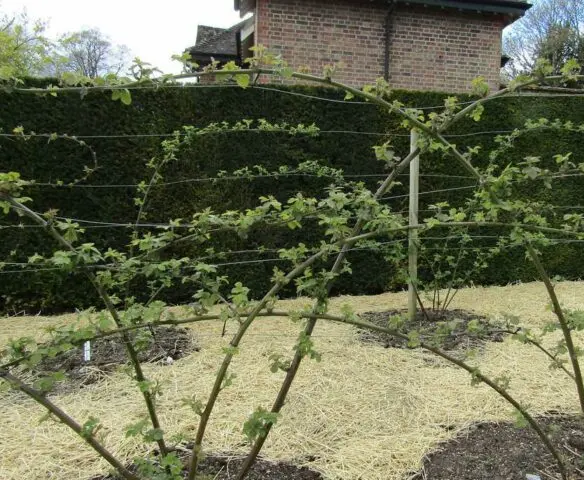
If you don’t provide Loch Mary blackberries with sufficient daylight hours, you can’t count on good yields.
Like other semi-creeping varieties, Loch Mary blackberries are grown exclusively on trellises. They are installed in advance, even before planting. The design is standard – vertical supports with horizontally stretched wire (3-4 rows). To make it more convenient to take care of the bushes and harvest, the height of the trellis is limited to 2-2,2 m.
A minimum of 2,5 m is left between Loch Mary blackberry seedlings, and 2-2,5 m between rows of bushes. The depth and diameter of the planting pit is 40-50 cm. A drainage layer is required at the bottom, and a nutrient mixture is on top of it.
Seedlings in the garden must be watered (5-10 liters of water) and mulched. The latter is necessary to prevent overheating of the roots and too rapid evaporation of moisture from the soil.
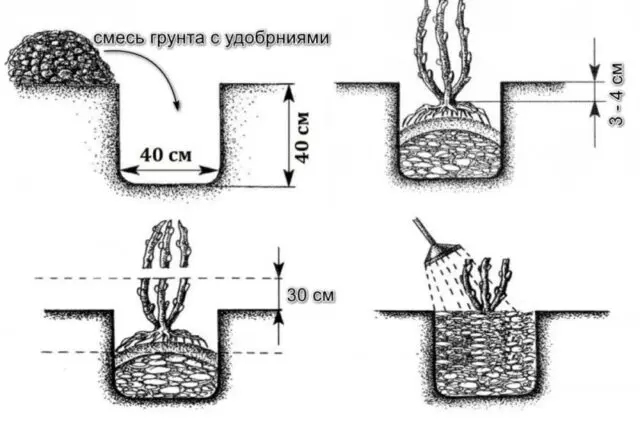
After planting, the root neck of the Loch Mary blackberry bush should be 3-4 cm below the soil level
Features of care
Blackberry care Loch Meri requires the same as other semi-creeping varieties:
- Watering. Both drying out and waterlogging of the soil are harmful for the crop, therefore there are no strictly defined intervals between irrigations. They are guided by the state of the substrate, the volume and frequency of natural precipitation, air temperature. On average, Loch Mary blackberries are watered weekly, the approximate rate is 20-25 liters.
- Loosening, weeding. An alternative to these bush care procedures is mulching.
- Application of fertilizers. In early spring, mineral nitrogen fertilizers are applied, once every 2-3 years – humus. Further, during budding, the formation of fruit ovaries, and about 20 days before harvesting, complex top dressing for berry bushes is introduced.
- Pruning and shaping the bush. As they grow, new shoots are tied to the trellis, spreading in different directions. Blackberry Loch Mary turns into a kind of fan. Fruiting branches are cut off at the end of the season. Sanitary pruning is carried out in early spring and late autumn.
- Preparing for winter. In the southern regions of the Loch Mary blackberry, an update of the mulch layer is enough to overwinter. In temperate climates, humus is added to the roots, forming a mound up to 20 cm high.
The most dangerous disease for Loch Mary blackberries is gray rot. A “fluffy” grayish coating with small black patches appears on the plant. The tissues under it darken, become slimy to the touch, gradually die off. For prevention at the beginning and at the end of the season, the bushes and soil in the garden are sprayed with any fungicide. Treatments are repeated in the summer, if the weather favors the development of the pathogen. To combat gray rot, the same drugs are used. The number of procedures and the concentration of the solution are indicated in the instructions.
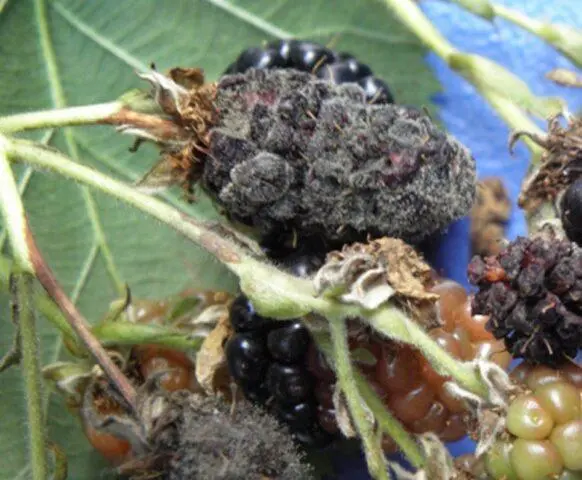
Blackberries affected by gray rot are unsuitable for food
Methods of reproduction
Blackberry Loch Mary successfully propagated by any vegetative method. The easiest way is to root cuttings or transplant basal shoots. Growing seedlings from seeds is also possible, but this method is not popular with gardeners.
Root transplant
Blackberry Loch Mary forms a lot of “offspring”, so there will be no shortage of planting material. In autumn, new specimens are dug out of the soil, cutting the root connecting them to the “mother” plant. Depending on the climate in the region, they can either be immediately transplanted to a new place, or “grow up” in the winter at home.
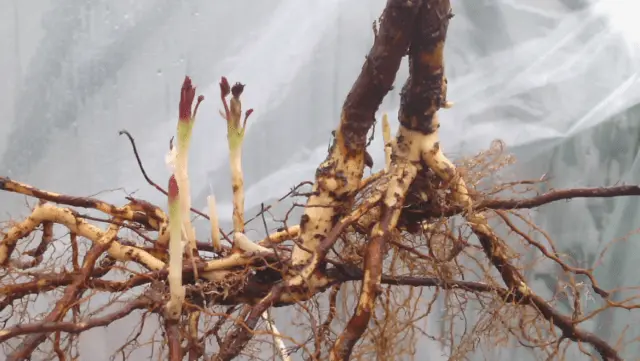
Like any blackberry, the Loch Mary variety is prone to the formation of root shoots and uncontrolled “spread” over the site.
Cutting
Blackberry cuttings Loch Mary – tops of shoots about 15 cm long with 3-4 growth buds. They are cut in the last decade of May or June. The cuttings are rooted in any loose, moisture-absorbing substrate, having previously been treated with a biostimulant. It is necessary to provide them with good lighting and create a “greenhouse effect”. Roots appear in 3-4 weeks. A month later, blackberry cuttings of Loch Mary can be transplanted into ordinary soil.
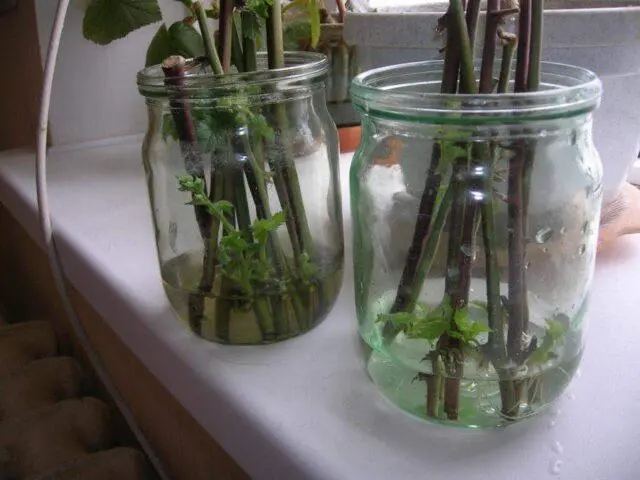
Rooted blackberry cuttings of Loch Meri are transplanted into the garden either in the fall of the same year or in the spring of the next
Conclusion
The Loch Mary blackberry is a relatively new, promising variety. The small size of the berries is more than compensated for by their outstanding taste and high yield. Plants require standard care, their immunity is good. Therefore, the variety can be recommended not too experienced gardeners.









